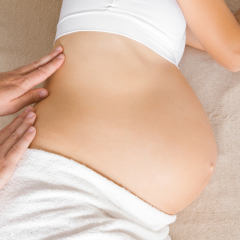%20(Blog%20Banner)-1.png?width=2240&name=Copy%20of%20New%20Blog%20Post%20Announcement%20Instagram%20Post%20(Blog%20Graphic)%20(Blog%20Banner)-1.png) We might not spend too much time thinking about them, but hormones are essential for life, and they play a major role in puberty and dictating bodily changes at all stages right through to menopause.
We might not spend too much time thinking about them, but hormones are essential for life, and they play a major role in puberty and dictating bodily changes at all stages right through to menopause.
Fertility and pregnancy are both directly related to our hormones and the body’s menstrual cycles – a correct hormone balance is crucial to getting pregnant. So, if our hormones are functioning as they should, and we are ovulating and menstruating as we should be and making good quality eggs then everything should be in place to conceive naturally.
There are many hormones that work together to create an ideal environment for an embryo to grow. However, there are many variables when it comes to hormones and one of the first things your GP or fertility expert will undertake is a series of hormone balance tests.
AMH
An AMH test will test your Anti-Mullerian Hormone. This hormone is produced in your ovarian follicles – the tiny sacs in your ovaries that house and release eggs. While your AMH isn’t a crystal ball into your fertility future, it can tell you a lot about your reproductive health as it’s a reliable screening marker of ovarian reserve (aka how many eggs you have). A high AMH likely means you have a longer reproductive window however a lower AMH (lower ovarian reserve) doesn’t necessarily mean you won’t be able to get pregnant as the quality of the eggs might be very good (and remember you just need one good egg and one good sperm!).
LH
Luteinizing hormone (LH) is key to understanding ovulation and when you are most fertile. LH is produced by the pituitary gland and is one of the main hormones that control the reproductive system. When the body’s levels of LH rise, it triggers the start of ovulation, and the most fertile period of the menstrual cycle begins. Tracking the increase in LH levels can help couples to plan intercourse and increase the chances of becoming pregnant.
Understanding what LH is, when levels rise and the relationship between this increase and fertility can be important when trying to conceive.
Progesterone
Progesterone, sometimes called the pregnancy hormone plays an important role in fertility and pregnancy. It is a common female hormone found naturally in a woman’s body and is responsible for preparing the womb for pregnancy by thickening the lining of the womb to help give the fertilised egg a safe place to grow.
Women natural produce progesterone in the ovaries, the placenta and the adrenal glands during pregnancy. Progesterone (as a prescribed hormone supplementation) is often necessary during Assisted Reproductive Technology (ART) procedures, such as in-vitro fertilisation (IVF) partly because the medications you may use during these procedures can suppress your body’s ability to produce progesterone.
hCG and hPL
If a viable sperm meets the matured egg and is implanted onto the uterine lining, hCG is produced and you’ve got a pregnancy on your hands (when you take a pregnancy test, it’s the hCG levels which are being tested). hCG is present only during pregnancy and provides a fresh embryo with the nourishment it needs to develop further. At 11 weeks of pregnancy this hormone drops off and hPL takes over and provides the foetus with what it needs to develop into a baby.
The reasons for infertility are many and varied but the treatments and comprehensive diagnostics available to assist you in becoming pregnant are simple and effective and we at ReproMed have some of the best success rates in Ireland.













